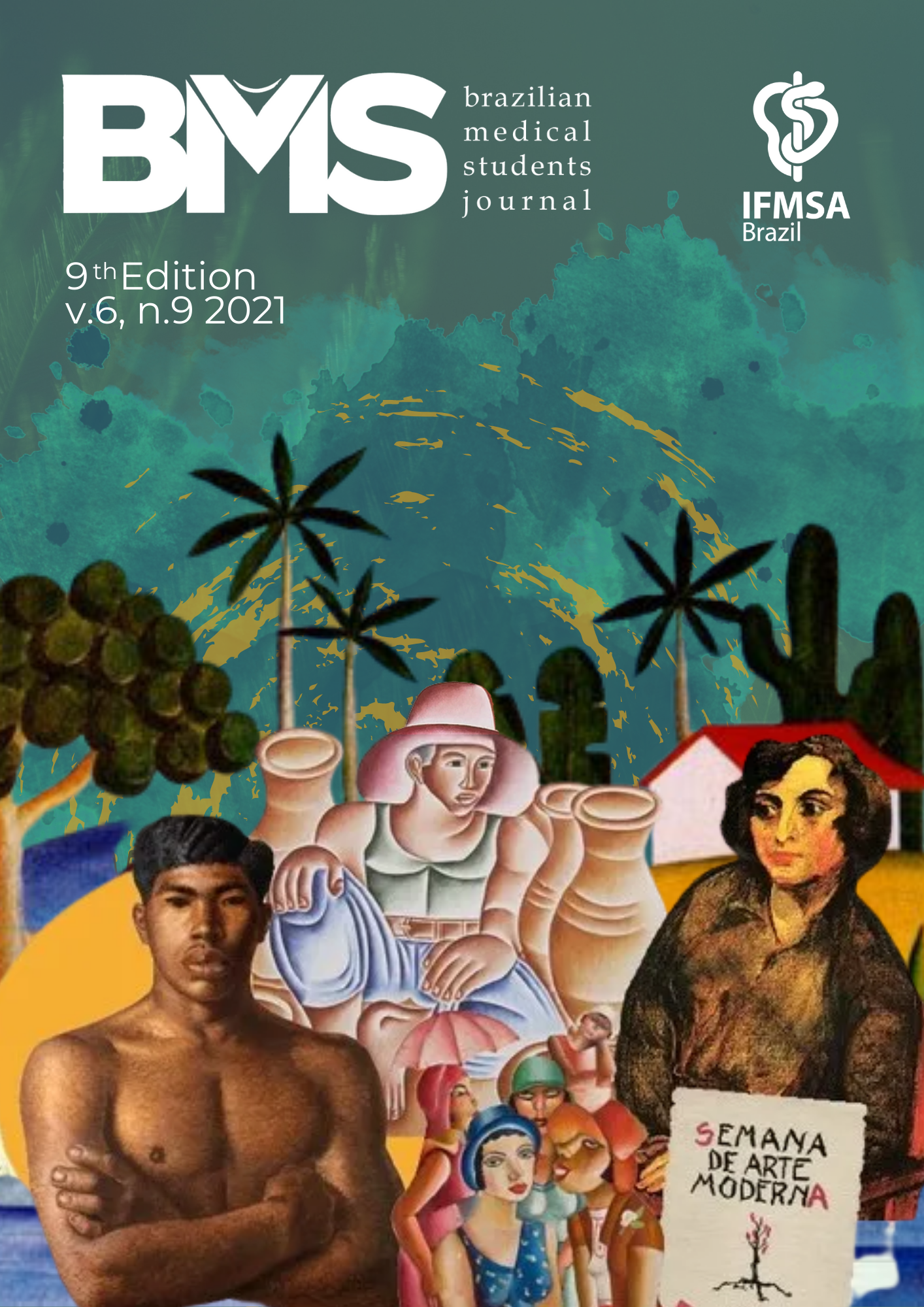NARRATIVE REVIEW ON THE INFLUENCE OF SPIRITUALITY ON CARDIOVASCULAR HEALTH
DOI:
https://doi.org/10.53843/bms.v6i9.279Abstract
Introduction: Spirituality is defined as an intrinsic aspect of the human being with the search for the transcendent, divine and meaning of life. Its presence is mainly described in health, imphasising on cardiovascular health. The Brazilian Society of Cardiology (SBC) demonstrate that cardiovascular diseases (CVD) are the leading cause of death in Brazil and worldwide. In this sense, the main of the article is to describe the impact of spirituality on cardiovascular health. Method: Integrative review carried out by searching the descriptors "spirituality", "cardiology", "cardiovascular disease", "Cardiovascular system" and variations in the PubMed, Scielo and Lilacs databases. Original articles and reviews published between 2016 and 2021 in English, Portuguese or Spanish were included in this study. Results: Among the selected articles, the positive impact of spirituality on primary and secondary cardiovascular prevention was evidencieded, also on coping with cardiac comorbidities and on reducing mortality. Less impact was seen in terms of improved prognosis in patients with heart failure; in contrast, there is a reduction in ischemic events and a higher level of quality of life. Discussion: Spirituality is a topic broadly discussed in the literature.The most effective ways of applying spirituality were yoga, meditation, forgiveness, and gratitude. The main impacts were related to stress reduction, greater adherence to treatment and better coping with comorbidities. The application in the cardiac context was recommended by the studies analyzed, especially by the SBC in its cardiovascular prevention guideline. Conclusion: Although the topic has published publications,is necessary that more clinical studies expose the impact of spirituality on the prognosis of heart disease and that also demonstrate effective ways and practices of applying spirituality in the hospital and ambulatorial context, so then they will be stimulated by health professionals and therefore the greatest impact in pacients lifes will occur.
Metrics
References
Koenig, HG et al. Handbook of religion and health.
Oxford: Oxford University Press. 2001. ISBN
‐9.
Puchalski, Christina M.. The FICA Spiritual History Tool
Journal Of Palliative Medicine, 2014, [s.l.], v. 17, n.
, p.105-106. Mary Ann Liebert Inc.
http://dx.doi.org/10.1089/jpm.2013.9458. DOI: https://doi.org/10.1089/jpm.2013.9458
Anandarajah, G; Hight, E. Spirituality and medical
practice: using the HOPEquestions as a practical tool for
spiritual assessment. American Family Physician, [s. l.],
ano 63, n. 1, p. 81-89, 1 jan. 2001.
Lucchetti, G. et al. Espiritualidade na prática clínica: o
que o clínico deve saber?. RevBrasClinMed, 2010, [s. l.],
v. 8, ed. 2, p. 154-158.
Précoma DB, Oliveira GMM, Simão AF, Dutra OP,
Coelho OR, Izar MCO, et al. Atualização da Diretriz de
Prevenção Cardiovascular da Sociedade Brasileira de
Cardiologia – 2019. ArqBrasCardiol. 2019; 113(4):787-
Abu HO, McManus DD, Kiefe CI, Goldberg RJ.
Religiosity and Patient Activation Among Hospital
Survivors of an Acute Coronary Syndrome. J Gen Intern
Med. 2020 Mar 1;35(3):762–9. DOI: https://doi.org/10.1007/s11606-019-05345-4
Schnell T, Fuchs D, Hefti R. Worldview Under Stress:
Preliminary Findings on Cardiovascular and Cortisol
Stress Responses Predicted by Secularity, Religiosity,
Spirituality, and Existential Search. J Relig Health. 2020
Dec 1;59(6):2969–89.
Abu HO, Ulbricht C, Ding E, Allison JJ, Salmoirago-
Blotcher E, Goldberg RJ, et al. Association of religiosity
and spirituality with quality of life in patients with
cardiovascular disease: a systematic review. Qual Life
Res. 2018 Nov 1;27(11):2777–97. DOI: https://doi.org/10.1007/s11136-018-1906-4
Pullen P, ... WS-I journal of, 2018 undefined. Yoga for
heart failure: a review and future research.
ncbi.nlm.nih.gov [Internet] [Internet]. [cited 2021 Aug 26]; Available Available
from:
https://www.ncbi.nlm.nih.gov/pmc/articles/PMC5934956/.
Chinnaiyan K, Revankar R, ... MS-EH, 2021 undefined.
Heart, mind, and soul: spirituality in cardiovascular
medicine. academic.oup.com [Internet]. [cited 2021 Aug
; Available from:
https://academic.oup.com/eurheartj/advance-article-
abstract/doi/10.1093/eurheartj/ehab080/6168233.
Koenig HG, Pargament KI, Nielsen J. Religious coping
and healthstatus in medically ill hospitalized older adults.
J Nerv Ment Dis. 1998;186(9):513-21.
Lucchese FA, Koenig HG. Religion, spirituality and
cardiovascular disease:research, clinical implications,
and opportunities in Brazil. Rev Bras Cir Cardiovasc.
;28(1):103-28.
Gomes FC, Andrade AG, Izbicki R, Moreira Almeida A,
Oliveira LG.Religion as a protective factor against drug use among Brazilian university students: a national
survey. Braz J Psychiatry. 2013;35(1):29-37. DOI: https://doi.org/10.5325/editwharrevi.29.1.0035
Lloyd-Jones D, Adams RJ, Brown TM, Carnethon M,
Dai S, De Simone G,et al. Heart disease and stroke
statistics--2010 update: a report from the American
Heart Association. Circulation. 2010;121(7):e46-e215.
Feinstein M, Liu K, Ning H, Fitchett G, Lloyd-Jones DM.
Incident obesityand cardiovascular risk factors between
young adulthood and middle ageby religious
involvement: the Coronary Artery Risk Development in
Young Adults (CARDIA) Study. Prev Med.
;54(2):117-21.
Puchalski CM, Vitillo R, Hull SK, Reller N. Improving the
spiritualdimension of whole person care: reaching
national and internationalconsensus. J Palliat Med.
;17(6):642-56.
VanderWeele TJ, Balboni TA, Koh HK. Health and
Spirituality Spirituality. JAMA.2017;318(6):519-20. DOI: https://doi.org/10.1001/jama.2017.8136
Lucchetti G, Oliveira LR, Koenig HG, Leite JR, Lucchetti
AL, CollaboratorsS. Medical students, spirituality and
religiosity--results from the multicenter study SBRAME.
BMC Med Educ. 2013 Dec;13:162.
Downloads
Published
How to Cite
Issue
Section
License
Copyright (c) 2022 Isabela Simoes Mendes, Teófilo Tavares da Silva, Pedro Guido Rocha de Almeida, Guilherme Augusto Detome Vertelo, Mariana Nunes Soares, Andressa Carvalho Freire, Murillo Cintra Husni

This work is licensed under a Creative Commons Attribution 4.0 International License.
User licenses define how readers and the general public can use the article without needing other permissions. The Creative Commons public licenses provide a standard set of terms and conditions that creators and other rights holders can use to share original works of authorship and other material subjects to copyright and certain other rights specified in the public license available at https:// creativecommons.org/licenses/by/4.0/deed.pt_BR. Using the 4.0 International Public License, Brazilian Medical Students (BMS) grants the public permission to use published material under specified terms and conditions agreed to by the journal. By exercising the licensed rights, authors accept and agree to abide by the terms and conditions of the Creative Commons Attribution 4.0 International Public License.






